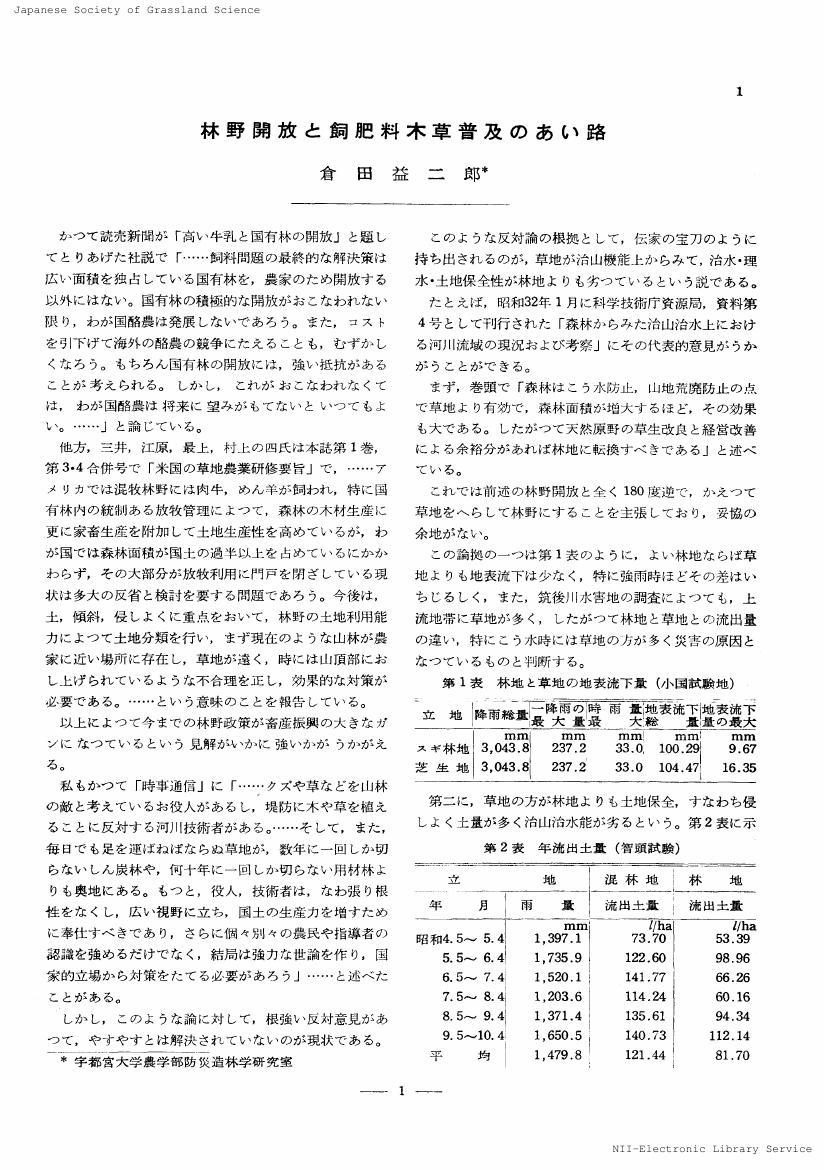1 0 0 0 OA 林野開放と飼肥料木草普及のあい路
- 著者
- 倉田 益二郎
- 出版者
- 日本草地学会
- 雑誌
- 日本草地研究会誌 (ISSN:04475941)
- 巻号頁・発行日
- vol.3, no.1-2, pp.1-3, 1957 (Released:2017-09-29)
1 0 0 0 OA (7)菌害回避更新論
- 著者
- 倉田 益二郎
- 出版者
- 一般社団法人日本森林学会
- 雑誌
- 日本林學會誌 (ISSN:0021485X)
- 巻号頁・発行日
- vol.31, no.1, pp.32-34, 1949-02-28
- 被引用文献数
- 4
1) Introduction : The new theory on natural regeneration of forest by the prevention of bacterial injury dealt with in this treatise, is a hypothesis established on the supposition that, if the bacterial injury or damping-off is prevented, seeds and seedlings will sprout and grow well and lead to the luxury and growth of forest, in the meanwhile, if they suffer the injury of bacteria for lack of the prevention, they will not sprout and results in the ruin of forest in next generation. 2) Outline of Existing Theories on Natural Regeneration : No established theory seems to have been advanced yet on the cause for the formation of natural forest. There are, however, two theories, positive and negative. The positive one asserts the possibility of regeneration of forest by human power, the negative one insits upon the difficulty of artificial regeneration. Recently Dr, Yataro Sato has succeeded in his test on"Sugi"(Cryptomeria japonica. D. DON). Besides this, there are some other instances of success. 3) Result of Experiment : Dr. Hasegawa and others pointed out that the majority of the seedlings sprouting from the numerous seeds which fall in natural forests, perish through the infection of microbes. I, the researcher, ascertained this fact in a wood of"Kiri"(Paulownia tomentosa. STEUD.) first of all. As for the particulars, I refer to"The Journal of the Japanese Forestry Society". To sum up, I found that the seedling of Kiri thrives in such places as the burnt spot, the old seat of charcoal kiln, the moss-grown spot, the spot under eaves, the earthen wall, the straw thatched roof, the tile roof, the stony place, the railway track, the cleared spot in the wood, the reclaimed ground, etc. where anthracnose, the dreadful enemy of the young seedling can be avoided. The experiment on"Himeyashabushi"(Alnus firma. SIED. et ZUCC. var. Sieboldiana. WINKL.) proved the following facts ; a. Fusarium. bacteria kill the young seedling. b. The rainy weather and wet place are hot beds of diseases. The experiments on"Akamatsu"(Pinus densiflora SIED. et ZUCC.) and"Sugi"proved the following facts : a. Fusarium bacteria kill the young seedling. b. Diseases seldom break out in the clayey or the dry zones. c. Bacteria, though scattered, often fail to cause diseases in the clayey zone. d. Rain and humidity help the prevalence of diseases. e. In the sterilized or bacteria-proof zone, no seedling dies from want of sunlight even at a very dark place. 4) Disease Endurance and Shade Endurance : It seems that the"intolerant tree"is an appellation for the specie with weak endurance against diseases, while the"tolerant tree"is an appellation for"one with strong endurance against them". The seedling can easily avoid the bacterial injury at a place which is unfavourable or almost unfit for the breeding of bacteria such as the dry slope or hill top, the sterilc soil containing little humus, the sunny place, etc. But at a place of the opposite condition it falls a easy victim to the bacterial injury. It seems to me that the species with the above property is called"intolerant tree"or"one with weak shade endurance", while the another specie which can thrive under the same conditions enduring against diseases, is called the"tolerant tree"one with strong shade endurance."5) Cause for the Formation of Natural Forest : The natural forest may have deen formed as the result of various requisites having been met. The most important factor among these requisites is the prevention of bacterial injury from the seedling. If the seedling suffers the bacterial injury no forest will come into existence no matter how favourable other circumstances may be. "Akamatsu"is the weakest against the bacterial injury, but it regenerates well in the burnt place, the sterile soil, the spot of land slide, the hilltop, etc. "Sugi"is a little stronger than Akamatsu against diseases, but it is believed that it can thrive well in the above mentioned places where the bacterial injury can easily b
1 0 0 0 OA 〇桐播種試験報告(1.造林)
- 著者
- 倉田 益二郎
- 出版者
- 一般社団法人日本森林学会
- 雑誌
- 日本林學會誌 (ISSN:0021485X)
- 巻号頁・発行日
- vol.21, no.11, 1939-11-10


